Adherence to Psychotropic and Nonpsychotropic Medication Among Patients With Bipolar Disorder and General Medical Conditions
Abstract
Objective:
This study assessed the relationship between nonadherence to psychotropic and nonpsychotropic medications for 88 patients nonadherent to medication treatment for bipolar disorder.
Methods:
This descriptive study was part of a clinical trial promoting medication adherence. Nonadherence was defined as ≥20% of days with missed doses.
Results:
A majority of the sample was female and had type I bipolar disorder; 49% had hypertension, 39% had hyperlipidemia, and 69% smoked; average body mass index was 34, and 65% were obese. The median proportion of days with missed doses was 53.6% (interquartile ratio [IQR]=38.10%−73.40%) for psychotropic medications and 33.93% (IQR=13.81%−51.91%) for nonpsychotropic medications. There was a significant difference between nonadherence to psychotropic and nonpsychotropic medication for the past week (z=−4.11, p<.001) and past month (z=−4.19, p<.001). More global psychopathology was associated with nonpsychotropic nonadherence.
Conclusions:
Psychotropic adherence was worse than nonpsychotropic adherence, yet both were poor. Improving adherence to cardiovascular medications is a reasonable pathway to improve cardiovascular health in this population.



